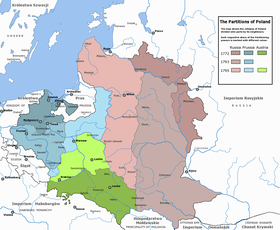Prussian Partition of Poland
| The Prussian Partition | |
|---|---|
| The Commonwealth | |

The Polish–Lithuanian Commonwealth in 1772
|
|
| Elimination | |

The three partitions of the Polish–Lithuanian Commonwealth. The Russian Partition (Red), the Austrian Partition (green), and the Prussian Partition (blue)
|
The Prussian Partition (Polish: Zabór pruski; sometimes called the Prussian Poland) refers to the former territories of the Polish–Lithuanian Commonwealth acquired during the partitions of Poland in the late 18th century by the Kingdom of Prussia. The Prussian acquisition amounted to 141,400 km2 (54,600 sq mi) of land constituting formerly western territory of the Commonwealth. The first partitioning led by imperial Russia with Prussian participation took place in 1772; the next one in 1793, and the final one in 1795, resulting in Poland's elimination for the next 123 years.
The Kingdom of Prussia (known from the second half of the 19th century as the German Empire) acquired Polish territories in all three military partitions.
Major historical events of the Prussian Partition included the 1772 annexation of the formerly Polish Prussia by Frederick II who quickly implanted 57,475 German families there in order to solidify his new acquisitions. The Polish language was marginalized. In 1793, the Kingdom of Prussia annexed Gdańsk (Danzig) and Toruń (Thorn), part of the Crown of Poland since 1457. The incursion sparked the first Greater Poland Uprising in Kujawy under Jan Henryk Dąbrowski. The revolt ended after General Tadeusz Kościuszko was captured by the Russians. The subsequent third partitioning of 1795 marked the Prussian annexation of Podlasie region, with the remainder of Masovia, and the capital city of Warsaw (handed over to the Russians twenty years later by Frederick III).
...
Wikipedia
